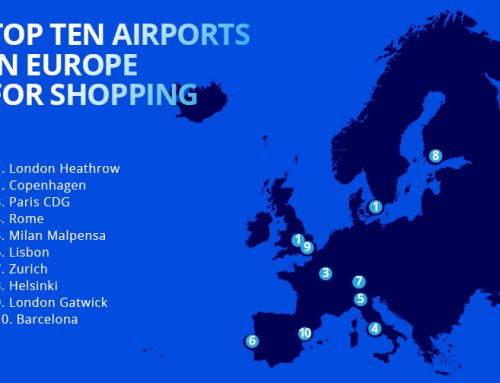Does the travel retail market hurt the local market business?
When brands reject travel retail market opportunities because of local exclusivity deals, they miss out on business opportunities that have the potential to increase revenue and bring greater exposure to their brand.
The travel retail market is the hot topic of the day in business. In 2017, it raked in a total of $68.6 billion dollars according to data provided by the Duty Free World Council. Current market estimates state that the market will continue to grow and may even be worth a little under $113 billion dollars by 2025. The numbers don’t lie, the travel retail market is a sector that due to its growth, presents an ideal business opportunity for brands of all sizes.
What causes this phenomenon? It is estimated that over 1 billion people travel internationally per year and travelers are increasingly looking for ways to enhance their traveling experience. The duty-free market is one of the ways travelers have been able to find the products they need either for use during travel or to bring back to their respective countries. Brands benefit from the travel retail market by giving themselves more visibility, reach a wider and more global clientele and experience growth.
Entering into the market, however, poses some challenges as the duty-free and travel retail markets function under different rules, guidelines and regulations leading many to characterize the market as functioning like a 6th continent. The lack of understanding and knowledge about this characteristic can bring some confusion, hesitation, and perhaps suspicion about the travel retail market and whether it is a worthy market to invest in.
This challenge and hesitation are evident when it comes to local exclusivity deals. Many brands invest on local exclusivity deals that limit the selling of their products to specific retailers. This strategy can make it nearly impossible for a brand to add to their value by selling in the travel retail and duty-free market and can ultimately hurt them in the long-run as they miss out on their global potential, by having more visibility and exposure to billions of travelers worldwide.
Brazil: the duty-free gold-mine
One example of this is in South America, one of the bastions of the duty-free market and a place with endless business opportunities for brands. Traveling to and from this continent continues to grow and due to this, brands benefit from tapping into the duty-free market.
For example, in Brazil data shows that more and more Brazilians are traveling worldwide. According to the Central Bank and Tourism Ministry, nearly 9 million Brazilians travel internationally each year. In 2016 alone, those Brazilians spend upwards of $14 billion dollars while traveling.
It is clear to see that Brazil offers an unique opportunity for any brand seeking to engage in the travel retail market, however, when brands choose to supply only local dealers over travel retail market investment means you are shut out from a vast international market and the 12 billion dollars worldwide that Brazilians spend on duty-free products while traveling
There are other challenges of local exclusivity deals. Many times, when brands attempt to enter into the travel retail market through local distributors, those same distributors treat the market as if it’s a local market and are inept at understanding the international nature of the duty-free and travel retail market. This leads to many missed out opportunities as brands are not marketed, displayed or sold properly to travelers.
The Brazilian market for duty-free products is set to improve in upcoming years due to a new quota policy enacted by Brazilian president, Jair Bolsonaro, which will come into effect in 2020. The new measure increases by doubling the quota of purchases that Brazilians can make in duty-free shops. This means that Brazilians are allowed to purchase more than before while traveling. In addition, it doesn’t affect in any way local businesses and the traditional market due to the differences in the character of both markets with one servicing travelers while another services local individuals.
None of the local stores associations in the market were opposed to the measure. The change does not seem to bother the entities that represent traditional commerce. The President of Alshop, an organization that gathers store owners of shopping centers in Brazil, responded to the new measure saying that it would only affect part of the population. He said, “It won’t affect that local commerce in any way.” By this we can understand that Duty Free commerce is not in competition with local markets. Therefore, choosing local exclusivity deals particularly as the Brazilian market is set to make more money, is detrimental to any brand that chooses such deals over the global potential that the duty-free market can bring.
The key of success is to combine local + global strategies in a way to enhance brand global awareness and increases product desire, therefore, demand. The luxury market of travel retail not always results in a high revenue to the manufacturer, but certainly add on value to the brand in a way of using its shelves as an unmeasurable window for products exposure.
But how will brands achieve success in the travel retail market? How can they market their products on a global scale so as to benefit their clients? They can follow the example of SDI Technologies, an american tech company who first entered the travel retail market by making a partnership with a company specialized in travel retail. Through its initial business deal, the brand was able to gain even more business opportunities, as their products began to be sold in places like Qatar Duty Free, Bahrain Duty Free, Lagardère Europe and Middle East, Dufry Colombia Duty Paid, Bolivia, Uruguay, Dufry Brazil Duty Free and Duty Paid, and even in the travel retail market of the United States. Other brands can follow SDI Tech’s example by investing in the travel retail market and seeing their brands flourish and gain visibility worldwide.
The travel retail market: benefits & challenges
Due to the duty-free market’s global and international nature, accessing it requires a different set of branding guidelines, sales strategies, know-how and approach that would make the brands attractive to international travelers. It is important to choose partners that know the market well and that would provide the brand with the best chance for success in the global travel retail market.
Travel Retail expert Renato Tesliuk, a former Dufry director, says that there are significant differences between the local market and the travel retail market that brands need to take into account. Tesliuk explains that when individuals go shopping in the traditional market they do so on purpose, looking for the best deals. However, shopping in the travel retail market is different: “In Travel Retail, the main objective is the trip itself. Buying is secondary and for that reason the sales strategies for brands need to be aligned with the available time that customers have to shop. Therefore, the commercial space at airports needs to be in constant flux so as to give more visibility to the stores.”
In many airports worldwide, spaces are designed so that passengers need to go through the duty free areas before reaching their gate. Tesliuk states that these differences between local retail and travel retail require different types of branding and sales strategy.
“Brands sometimes do not understand that travel retail sales operations require a higher margin than the traditional market,” Tesliuk said. “Products often need to be branded in a more attractive way than in the traditional market, by having a different packaging for example, so that the clientele can be attracted by products and special offers that can only be found at airport shops.”
Tesliuk says that many global companies have had success in the travel retail market because they recognize its value and go through the proper procedures to ensure favorable results in the market.
“Many global companies have a strong presence in the travel retail market today because all of their new products were first made available exclusively in the travel retail market for a specific period of time,” he said. “They developed special packages with special designs making those products more attractive. The exclusive appeal that the travel retail market has, needs to be reflected in the brand communication strategy”
Tesliuk emphasizes that it is imperative that brands understand the significant differences between the two markets and that the transition to the travel retail market should not be dealt with traditional market standards. In order for a brand to be successful in the travel retail market there needs to be several adjustments including price, marketing, and sales policies.
Brands: the travel retail channel increases global potential
What does all of this mean for brands? Investing in the duty-free, and thereof travel retail market is a sure way to help bring more visibility and growth to brands. It will show, not just a certain territory, but the world what those brands have to offer. Due to this, a brand that chooses not to invest in the travel retail market because of a local exclusivity deal is certainly missing out on their global potential.
What are the real benefits of entering the duty-free and travel retail market?
Here are a few:
- Exposure to a market of international clientele numbering in the billions. As the traveling population increases, so does the opportunity for a brand’s exposure on a global scale.
- Brands are introduced to a market owned by large business groups. Even if the local travel retail market may seem small, the likelihood of those stores being owned by large business groups is very high. For example, most duty-free stores are owned by billion-dollar companies like Lagardère, Dufry, DFS, Lotte Duty Free and others. If brands choose to sell their products in duty-free stores, they have the potential to gain recognition by these groups and most likely to be offered in a larger scale.
- Brand deals in the duty-free world can lead to opportunities outside of it. The increased exposure by joining the duty-free and travel retail market can lead to a higher demand outside of the duty-free market in a local scale.
Joining the travel retail market is a sure way to bring your brand greater visibility, more business opportunities, increased revenue and growth benefiting you in the long-run. Choosing local exclusivity deals over the duty-free market opportunities, however, can make it so your brand misses out on its global potential. A local error can lead to a greater global mistake. The best choice your brand can make is open itself up to an international market that will only stand to greatly benefit your business.
4-TR
10/20/2019



Leave A Comment